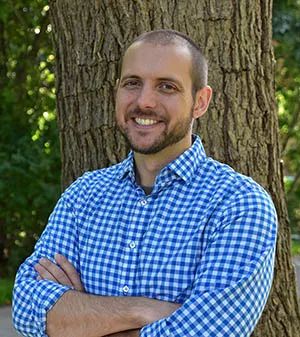
Top scholar at UTM in gender studies

His scholarly credentials are now placing him in an elite league of academics: based on Expertscape's PubMed-based algorithms, he is among the top researchers in his field and has the distinction of being a "World Expert" for his numerous contributions to the discourse on gender identity.
“When I found out about this ranking, my initial reaction was a bit surprised to be in the top 0.1% because it is such a big field and there are a lot of people who study gender identity,” says VanderLaan, an associate professor in the Department of Psychology.
“But I know that there are very few people studying children who are gender diverse, and there’s also very few people who are doing the kind of cross-cultural studies that my lab is doing.”
As Director of the Biopsychosocial Investigations of Gender (BIG) Laboratory, VanderLaan oversees a large team of undergraduate, graduate, and postdoctoral trainees. They employ a comprehensive approach that intersects neuroscience, as well as several psychology sub-fields, including developmental, cultural and social, cognitive, biological, and clinical.
The cross-cultural research that VanderLaan’s lab undertakes considers gender identity in North America, primarily in Toronto, as well as in Southeast Asia, with a particular focus on Thailand where VanderLaan has a field site and collaborators.
“Thailand, out of all human cultures, has probably the most socially visible sexual-orientation and gender diversity of any place on earth,” says VanderLaan.
“They have categories that go beyond the binary of men and women that have been recognized for decades, if not centuries. Of course, over the years Western ideas have been introduced into the mix with more traditional Thai categories, so there is an interesting cultural evolution in Thailand related to the different expressions and variations. But I thought that if I am going to better understand variation in both sexual orientation and gender identity, I should go to a place where that variation exists, and where it has more of a history of being highly socially visible and accepted.”
He provides examples regarding the variations in Thailand, such as the term sao praphet song, which translates to a “second kind of woman,” and relates to transfeminine individuals who were assigned male at birth. There is also a group of transmasculine individuals who were assigned female at birth and are known as toms, which has a similar meaning as “tomboy” in Thai culture.
The topic of variations also circles back to some of VanderLaan’s earliest research related to gender identity.
When he started down this academic path, he began working in the lab of Professor Paul Vasey at the University of Lethbridge in Alberta, who had just set up a field site in the Samoan Islands to study human sexuality and gender.
This led to VanderLaan's PhD work studying sexual orientation, and in particular a Samoan population of individuals assigned male at birth who are called fa’afafine, which means “in the manner of a woman.” Fa’afafine are considered to be a third or non-binary gender in Samoan culture, and their feminine gender expression is evident from a young age.
VanderLaan completed his PhD in Lethbridge and then held a postdoctoral position at the Centre for Addiction and Mental Health (CAMH) in Toronto before joining the faculty at UTM in 2015.
“In starting my program of research here, I wanted to return to the cross-cultural studies I had done previously because I felt like that was my training and those were my roots,” says VanderLaan, who also continues to do work with CAMH examining the brain development of trans adolescents who are in the process of gender transitioning through gender-affirming hormonal treatments.
VanderLaan thinks about the impact of his research in various ways, including having a wider reach with the Internet to research as well as to communicate findings more broadly around the world.
In addition, his work is unique because, unlike other gender diversity research, it happens “beyond the clinic” and clinic samples, transcending both North American as well as Western culture with its cross-cultural and community focuses, integration of multiple perspectives, and continued consideration of children and adolescents’ varied experiences of gender diversity throughout their youth.
“We see commonalities across places, but we also see differences, and I think a lot of those are driven by the ways that societies react to gender diversity,” says VanderLaan.
“I am interested in further exploring how growing up in a culture where you have been relatively accepted, and as a member of a gender-diverse group that is more visible within society, impacts someone’s development and wellbeing.”
Trans-Awareness week is November 13-19, and in the spirit of the occasion, scholars from around the world are being recognized for their work in this research area.
To learn more about gender identity, VanderLaan suggests a documentary from 2017 by The National Geographic called Gender Revolution; there is also a related special issue.
Along with that, VanderLaan encourages people to explore different media to hear directly from trans people themselves as a way to become more familiar with their experiences.
“I think just learning more, and making a concerted effort to be open minded and thoughtful about the subject is a good way to mark this week,” says VanderLaan.
“I am also thinking about my own efforts, such as how can I do outreach better? What kinds of information or questions can I ask to better understand mental health and access to care, and how sexual and gender diversity come to exist, but also how to help increase acceptance and lower stigma? These are things that I think about a lot.”
Further Resources
- For more information on Professor VanderLaan’s work, see the BIG Lab website.
- See this video to learn more about a nonbinary group in Mexico called Muxes.
